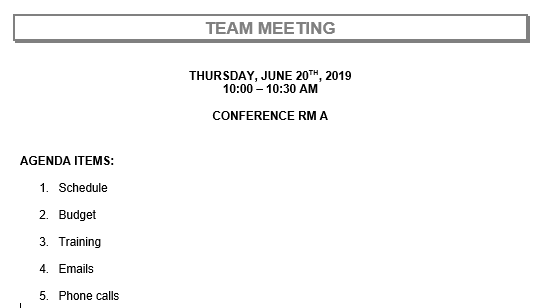There is a common quote by Plutarch that says, “The mind is not a vessel to be filled, but a fire to be kindled.” In other words, the mind is for having ideas, not holding them. To that end, it is important that we as leaders are setting our team members up for success by giving them the right tools to engage their minds to the best of their ability.
 It’s fairly common knowledge that there are multiple ways that people learn – the three basic learning styles that most experts agree on are visual, auditory, and kinesthetic. This means that the brain processes information through imagery captured by the eye (visually), by spoken word (audibly), or by physical activity, bodily sensations, and touch (kinesthetically). People learn by using all of these patterns in varying degrees depending on the circumstances, but most of us have a preferred pattern through which we learn best. Here are some essential tactics for how you can keep your audience and employees engaged:
It’s fairly common knowledge that there are multiple ways that people learn – the three basic learning styles that most experts agree on are visual, auditory, and kinesthetic. This means that the brain processes information through imagery captured by the eye (visually), by spoken word (audibly), or by physical activity, bodily sensations, and touch (kinesthetically). People learn by using all of these patterns in varying degrees depending on the circumstances, but most of us have a preferred pattern through which we learn best. Here are some essential tactics for how you can keep your audience and employees engaged:
Switch up Learning Styles - If I facilitate a meeting by lecturing at the attendees the entire time, and I have a room full of visual and kinesthetic learners, my lecture will fall on deaf ears. Conversely, if I have a room full of auditory learners and rely entirely on a Power Point presentation, I will not be successful in getting the information across to those folks who need to hear information to best absorb it.
Rather, meeting facilitators should mix it up in terms of how we present our information: use photos, charts, and graphs for your visual learners; use lecture, discussion, and Q&A sessions for your auditory learners; and allow your kinesthetic learners to do hands-on demonstrations when possible, play with fidget toys, and hear each other’s opinions and reactions to the information presented.
Get Your Agenda Out Before the Meeting - An organized and thoughtful agenda is another tactic that will support you holding a meeting in which your attendees are prepared and engaged. We’ve all walked into a meeting and been handed an agenda that looks like this:

There are a number of issues with this agenda and we’ll start with the fact that the attendees received the agenda as they were walking into the meeting. In order to conduct an efficient meeting, the facilitator must send out the agenda ahead of time so the attendees have a chance to review the agenda. Prepared attendees are more likely to engage in the topic at hand.
Personalize the Agenda Information - This agenda is also missing key information, such as who will be addressing each topic and how long will each topic be discussed. Furthermore, these topics are far too vague – you need actions words attached to give your topics meaning. For example, instead of “Schedule,” the first item could read, “Discuss Next Week’s Lunch Break Schedule for Front Desk Staff – Carol – 10 minutes.” This tells the rest of the attendees what schedule the facilitator is referring to, who is taking ownership of the discussion, and how long they intend to spend on the subject. The attendees also see that this is going to be a discussion where their input would be welcome, so they can think about what they may want to say in the meeting, if given the agenda ahead of time.
Be Specific! - Instead of “Budget,” item 2 might be, “Update Team on 2nd Quarter Spending – Janelle – 5 minutes.” In this example, it’s an update being given by the team leader, so the other attendees know they’re not responsible for preparing anything ahead of time for this item; they are just going to receive an update about their team’s spending in the 2nd quarter. If the meeting facilitator kept item 2 as “Budget,” the attendees might wonder, “Gee, am I being asked to come up with a budget? Should I have numbers prepared for this meeting? Am I going to have to answer questions about my team’s spending?” So it’s important that your agenda items are specific enough so your attendees feel prepared to engage meaningfully in your meetings.
Create a Space for Action Items - And finally, your agendas need to have a spot for action items where who, what, and when are outlined – that way, all meeting attendees know what was decided, who is responsible for next steps, and when those next steps are due. So if you had an agenda item that was, “Review Office Furniture Options & Make Final Decision,” you would want to have a spot directly underneath the agenda item for who, what, and when. It may look something like this:
Review Furniture Options for Executive Offices & Make Final Decision
Who: Sheryl will contact Business Interiors with committee’s decision
Decision: Committee chose Option 3
When: Email by Friday, end of day
Making meetings engaging and meaningful for all attendees is a difficult task – one that requires thoughtful planning on the part of the meeting facilitator or leader. Preparing materials and activities that appeal to the different learning styles of all attendees takes creativity and out-of-the box thinking. And sending out a detailed and informative agenda ahead of the meeting means that the leader needs to employ their critical thinking skills to figure out what outcomes he/she wants to come out of the meeting. These tasks may be difficult, but once you start preparing for and holding meetings in this way, you (and your attendees) will never want to go back!
COMMENTS